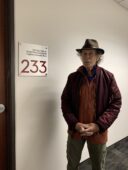
Autism therapists in Claremont, California CA

ARC Counseling and Wellness
Psychologist, Psy.D.
Whether you or your child has or might have an Autism Spectrum Disorder, we can help to clarify or determine a diagnosis, assist with the areas of your life including work, school or relationships where you may be struggling.
Advanced Psychological Associates & Wellness Center
Psychologist, PsyD, Phd, LMFT, LPCC, LCSW, Certified Hypnotist & Biofeedback Technician, Massage & Acupuncturist
Our goal is to help you uncover your true potential, and lead a life that is worth celebrating. While we can't change difficult situations of the past, we can work together to better understand and resolve challenges in your life. Our practice style is goal oriented using numerous approaches.
Paul Gonsier
Licensed Clinical Social Worker, M.S.W., L.C.S.W., NASW Diplomate
In private practice for 32 years. I am interested in assisting you with your emotional growth and well-being. It's normal at times in life to have conflicts, but sometimes we need guidance to discover healthier ways to navigate through these challenges to have a more healthy and rewarding life!
Teresa Rimmer
Marriage and Family Therapist, MS, LMFT
People with Autism Spectrum Disorder can benefit from learning how to respond to emotions and learning how to "read" people. While this may not come naturally, they can learn skills to handle people and situations better.
Valeriya Pestrikova
Marriage and Family Therapist
In my practice, I offer specialized support for individuals with Autism and Asperger's Syndrome. Utilizing a compassionate and integrative approach, I focus on enhancing communication skills, social interactions, and personal strengths. Together, we'll navigate the unique challenges and celebrate the distinct perspectives that Autism and Asperger's bring to your life.
Stephanie Brumfield
Therapist, MSW, ASW, PPSC
In my therapeutic approach, autism is embraced as a profound spiritual journey towards awakening to one's authentic self and the process of unmasking. This perspective honors the unique way autistic individuals experience the world, focusing on the deep self-discovery that comes from navigating life with an innate depth of feeling, heightened sensitivity, and a distinct way of processing experiences. By viewing autism through this lens, we celebrate the strengths, creativity, and insights that being autistic brings, shifting away from pathologizing to understanding autism as an integral part of one's identity and spiritual path.
The core of our work together is to empower autistic individuals to live authentically, leveraging their unique gifts to lead a life of fulfillment and connection. This journey involves developing strategies to manage sensory sensitivities, enhance communication, and foster meaningful relationships, all while reducing feelings of overwhelm and self-criticism. Central to this process is the unmasking of one’s true identity, shedding societal expectations and labels to reveal the authentic self beneath.
Seeing autism as a spiritual journey of awakening and unmasking allows us to support individuals in embracing their neurodiversity as a source of healing, strength, and profound personal growth. Together, we explore the richness of the autistic experience, fostering a deep sense of belonging, self-acceptance, and joy in the journey towards self-discovery and spiritual fulfillment. This approach not only affirms the value and beauty of the autistic way of being but also highlights the importance of celebrating each individual's journey towards embracing their authentic self.
Jillian Luz
Marriage and Family Therapist, LMFT, ATR
I have experience working with autistic children, teens, and adults. I conceptualize autism under the neurodiversity umbrella and do not view autism itself as something that needs to be "fixed", but rather understood. I strive to support my autistic clients in feeling empowered in how to best support any sensory or social-related issues they may experience. I also support clients in identifying and supporting any anxious and/or depressive symptoms that may be the result of unidentified autism in a neurotypical dominant world.
TREATMENT AND TOOLS FOR TRAUMA
Licensed Psychoanalyst, PH.D., IN PSYCHOANALYSIS AND NEUROSCIENCE, CERTIFIED PSYCHOANALYST, PSY.A, & LICENSED PSYCHOANALYST
My practice will diagnose and treat the 5 variations of autism including Asperger's Syndrome, Rett Syndrome, Childhood Disintegrative Disorder, Kanner's Syndrome, and Pervasive Developmental Disorder. I believe these problems are primarily a result of problems in the brain. The brain is not working normally, and hence neither is the mind. My treatment involves mind/brain approaches. You are welcome to call my office at 661-478-0667 for an evaluation.
Paula E. Bruce, Ph.D. & Associates, A Psychological Corporation
Psychologist, Clinical and Forensic Psychology
Our practice sees many clients who have never received an ASD diagnosis, but who suspect that they may struggle with difficulties consistent with mild ASD. These include social anxiety, OCD, difficulties in relating to others, extreme shyness and unusual interests and behaviors. We are skilled in helping clients managing these concerns and look forward to helping you with these.









